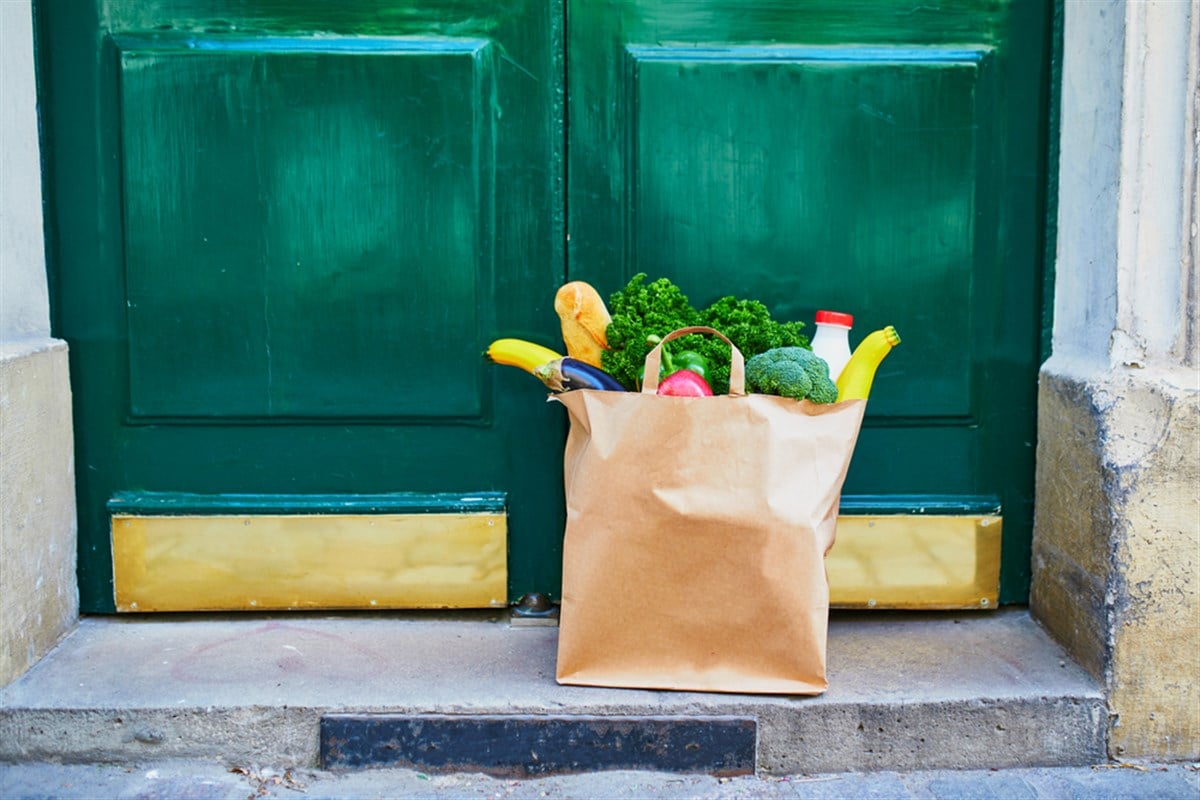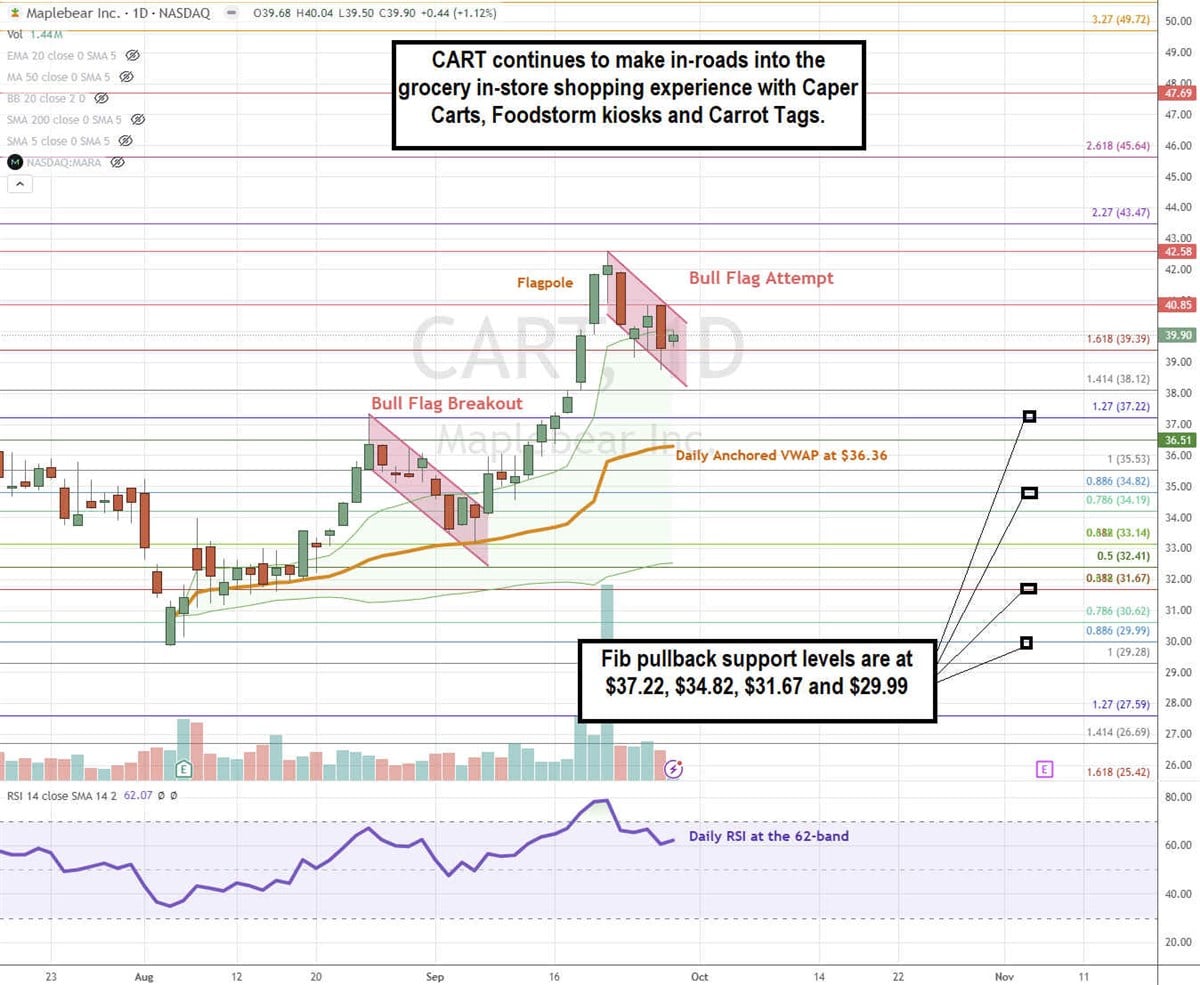
It can be confusing, but Maplebear Inc. (NASDAQ: CART) is better known as Instacart, the world's largest online grocery marketplace, and they also deliver groceries from over 85,000 stores to over 25 million people. However, unlike other delivery services like Uber Eats, owned by Uber Technologies Inc. (NYSE: UBER)) and the world's largest restaurant delivery service, DoorDash Inc. (NASDAQ: DASH) and Amazon.com Inc. (NASDAQ: AMZN); Instacart is making inroads into in-store shopping, not just delivery.
Its rollout of Flyers, a digitized version of weekly flyers from local supermarkets, and artificial intelligence (AI) powered Caper Carts, which scan, weigh, and track everything you put into your shopping cart at the grocery store, is paving the way to capturing a piece of the in-store grocery shopping experience. Instacart continues to transform itself in the business services sector. Investors are taking note of its 70% year-to-date (YTD) gains coming off fresh 52-week highs.
Instacart's Competitive Advantage: Convenience, Massive Network and Flexibility
Instacart uses a network of personal shoppers to fulfill orders at the stores and deliver them to customers. Delivery can be performed same-day, next-day, or even scheduled in advance. While grocery stores are the primary network, Instacart also includes major retailers, warehouse clubs and department stores as part of their massive networking including Home Depot Inc. (NYSE: HD), Costco Wholesale Co. (NASDAQ: COST), Walgreens Boots Alliance Inc. (NASDAQ: WBA), Walmart Inc. (NYSE: WMT) Sam’s Club, Sally Beauty Holdings Inc. (NYSE: SBH), and CVS Health Co. (NYSE: CVS).
Incidentally, non-members can shop at Costco through Instacart but will be paying non-member pricing. Costco members can add their member account number to their Instacart account to receive member pricing.
For retailers, Instacart enables them to turn in-store customers into omnichannel customers.
Revolutionizing In-Store Shopping: Instacart’s New Tech Solutions
Instacart continues to grab a foothold in the in-store shopping experience. Here are some of its transformative products:
- Caper Carts is just starting its rollout, but these smart carts will keep track of your items, creating a grocery list as you shop. The list can be adjusted and used for future grocery deliveries when you can't make it to the store. Additionally, you can avoid checkout lines when using Caper Carts, as you can pay for your groceries on the cart or in the app.
- Carrot Tags enhance a store's existing electronic shelf labels (ESLs), enabling Instacart shoppers to scan and fulfill orders quickly. For in-store shoppers, Carrot Tags display information showing real-time eligibility for promotions, dynamic pricing, or EBT SNAP benefits. Instacart is linking Carrot Tags to Caper Carts to provide value-added service to in-store shoppers, who are alerted to discounts and promotions for items on their shopping list in real-time.
- FoodStorm is a made-to-order prepared food platform available online, in-app, by phone, by e-mail, and at kiosks in-store ordering kiosks that enable customers to order prepared foods, like building a sandwich for pick-up from the deli or placing bakery and butcher counter orders, saving time and improving accuracy. It can also be used for catering orders. These are also linked to the Instacart app, which makes it convenient for customers to pick up in-store counter items without waiting in line.
Instacart CEO Fidji Simo stated, “The beauty of all of our In-Store technologies is that they connect directly with Storefronts and with each other, so it's really a seamless experience for customers to buy from retailers online and In-Store.”
Simo added, “While it may seem like new retail media networks are popping up left and right, right now, we know that brands have limited time and resources, and they will ultimately want to work with platforms that have scales across all channels. And this is exactly where Instacart ads will shine because of our leading scale, performance, measurement, data, and product capabilities.”
Maintaining Real-Time Updated Product Availability Is a Science
It's no easy task adding stores to its network since the Instacart app has to inventory all the products along with availability data in real-time for all the stores. This is done in a number of ways, like having the retailers send the updated availability and product data to Instacart through its API in real-time or once a day. Many retailers use real-time streams of items and their balances in hand. Instacart will utilize its machine learning (ML) algorithms to estimate availability without updates.
Instacart Joins the Ibotta Performance Network
The Ibotta Performance Network (IBN) enables its 50 million members to access Instacart's network of 85,000 grocery stores and over 1,500 retail banners. Ibotta provides cash rebates for purchases, and users can apply rebates toward Instacart delivery and service fees when they order groceries and products through Instacart.
CART Stock Sets Up a Second Bull Flag Pattern
A bull flag pattern is triggered when the stock surges through the upper parallel descending trendline resistance. The flag is formed after a steep run-up, forming the flagpole. It is comprised of parallel descending upper and lower trendlines indicating lower highs and lower highs.

CART surged to 52-week highs at $42.58 on Sept. 20, 2024, to complete the flag pole run-up. The flag formation is followed by parallel descending upper and lower trendlines marking lower highs and lower lows. The bull flag can trigger if CART can surge through the upper trendline resistance above $40.85. The anchored daily VWAP support is at $36.36. The daily relative strength index (RSI) fell to the 62-band. Fibonacci (Fib) pullback support levels are at $37.22, $34.82, $31.67, and $29.99.
Maplebear’s average consensus analyst price target is $43.33, and its highest analyst price target sits at $50.00. It has 14 Buy ratings and 11 Hold ratings from analysts.
Actionable Options Strategies: Bullish investors can buy on pullbacks using cash-secured puts at the Fib pullback support levels. Bullish options investors take a bullish call debit spread for less capital than owning the stock while minimizing downside and capping upside gains.
